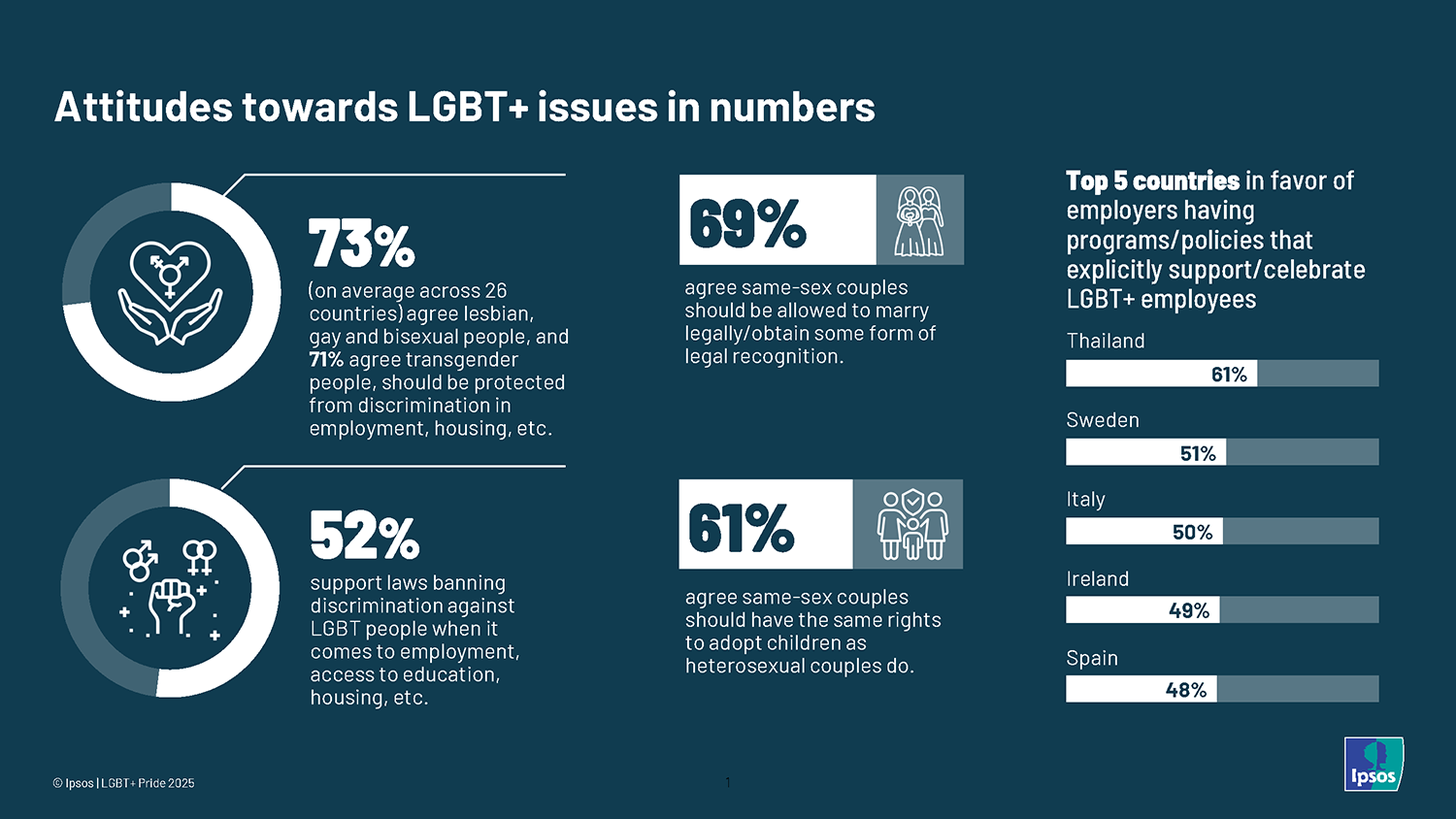Ipsos Pride Survey 2025: Majority are for anti-discrimination protections, but support slips for several LGBT+ issues
Key findings
- Majorities in all countries say that LGBT people should be protected from discrimination in areas like employment and housing.
- Support for brands promoting LGBT rights declines to 41% (on average across 23* countries) from 49% in 2021.
- Just over 1 in 3 (38%, new across 26 countries) are for LGBT+ initiatives at work, while 24% oppose this.
- 69% now support same-sex marriage/legal recognition, with those in Spain (86%) most supportive and people in Türkiye (34%) least in favor.
- The proportion in favor of transgender athletes competing based on the gender they identify with is down 10 points to 22% since 2021.
- Generation Z** women are continuing to lean more liberal than other cohorts, including their male peers, on several issues.
Download the Report Download the Key Findings
The path to progress is often filled with potholes and roadblocks.
And so it is with the ongoing journey to equal rights and full acceptance of the LGBT+ (lesbian, gay, bisexual, transgender, plus) community around the world.
While social media and tabloid news outlets can make it seem like there has been a large “wokelash” against all things Pride Month the reality is more nuanced.
Our new Ipsos LGBT+ Pride Report 2025 finds support for many issues has indeed fallen since our global Pride polling in 2021, but there are some bright spots.
Theory vs. reality
Close to three in four, on average across 23 countries*, still agree people who identify as LGB (72%, -5 percentage points since 2021) and trans (71%, -5pp) should be protected from discrimination in employment, housing, and access to businesses such as restaurants and stores.
Meanwhile, same-sex unions and families enjoy fairly solid acceptance in most countries in our survey this year. Support for same-sex marriage/legal recognition is down to 69% (on average across 23 countries) in 2025 from 74% in 2021. Peru has seen the most dramatic drop to 48% (-20pp versus 2021) in the proportion in favor of same-sex marriage/recognition, while France has seen the biggest uptick (67%, +5pp).
And support for same-sex couples having the same rights to adopt children as heterosexual couples fell five points to 59% in 2025, from 64% in 2021. Support fell 14 points in Türkiye to just 25% while support for same-sex couples adopting children rose the most in Germany, out of the 23 countries in our 2021 poll, to 74% (+5pp).
Though it’s key to note that while people in theory agree with anti-discrimination protections, just over half (51%, -6pp since 2021) say they support laws banning discrimination against LGBT people when it comes to employment, access to education, housing and social services, etc.
Gen Z women continue to go their own way
Younger females are leaning liberal on several LGBT+ issues while many other cohorts, including their younger male peers, are leaning more centrist or conservative these days.
The Ipsos Generations Report 2025 dives deeper into how Gen Z men and women continue to diverge on several social issues, ranging from women’s rights to climate change. A similar pattern showed up in our 2024 Pride report.
The biggest divides in 2025 appear in how businesses support LGBT+ people.
While almost three in five (58%) Gen Z women are in favor of companies/brands actively promoting equality for LGBT people only 34% of Gen Z men agree. And there’s also a 24-point gap when it comes to whether employers should have programs/policies that explicitly support/celebrate LGBT+ employees with 53% of younger women supporting this compared to just 29% of younger men.
Rumors of an overwhelming ‘wokelash’ somewhat exaggerated
Over the past few years many private businesses in Western countries chose to take very public stances on everything from racism to homophobia.
There’s now a chill in the air.
As a result some companies have scaled back, or completely scrapped, Pride initiatives this year.
Four years ago, almost half (49% on average across 23 countries) said they supported companies/brands actively promoting equality for LGBT people. By 2024, that support had fallen five points to 44% and has now dipped year-over-year to 41% (with 23% currently opposed).
At the same time, opposition has stayed relatively steady, with only 12% now saying they’re strongly opposed and just over one-third (36%) neither supporting nor opposing these marketing efforts.
As always, the devil’s in the data details.
More men across the generations than women currently strongly oppose companies/brands actively promoting equality for LGBT people. Close to one in five (17% on average across 26 countries) of Generation X men, followed by Gen Z (16%), Millennial (15%) and Baby Boomer (12%) men strongly oppose this, that’s compared to 10% of Millennial women, 9% of both Gen X and Boomer women and 7% of Gen Z women.
A steep hill to climb
Since being inaugurated in January U.S. President Donald Trump has declared a “war on woke” and says he has “ended the tyranny of so-called diversity, equity and inclusion policies all across the entire federal government and indeed the private sector and our military.”
But, do most Americans have a problem with DEI government policies, including those protecting LGBT+ people? It depends.
Support for specific trans rights, in particular, remains fairly low in the U.S. and globally.
For example, those in favor of government-issued documents, such as passports, including an option other than "male" and "female" for people who do not identify as either has dropped slightly to 38% in America (-3pp since 2024) and to 46% (-6pp) on average across 23 countries*.
Notably almost half (48%) of Americans now oppose government-issued documents including an option other than "male" and "female", compared to 40% at a global level.
The Trump government has seized on this moment in time and recently began issuing passports with only “an M or F sex marker that match[es] the customer's biological sex at birth,” though the move has faced outcry from activists and is facing legal challenges.
Whether public acceptance of a range of LGBT+ issues continues to trend downwards in the second half of this decade remains to be seen. One thing that’s clear? The fight for rights and acceptance is far from over even in 2025.

Previous Reports: 2024 | 2023 | 2021
About this study
These are the results of a 26-country survey conducted by Ipsos on its Global Advisor online platform between Friday, April 25 and Friday, May 9, 2025. For this survey, Ipsos interviewed a total of 19,028 adults aged 18-74 in Canada, Republic of Ireland, South Africa, Türkiye, and the United States, 20-74 in Thailand, 21-74 in Singapore, and 16-74 in all other countries. The “26-country average” reflects the average result for all the countries and markets where the survey was conducted. It has not been adjusted to the population size of each country or market and is not intended to suggest a total result.
*Change for 23-country average is based on the countries which were in prior editions of the Ipsos LGBT+ Pride report.
**Generation Z (born between 1996-2012), Millennials (born between 1980-1995), Generation X (born between 1966-1979) and Baby Boomers (born between 1945-1965).



